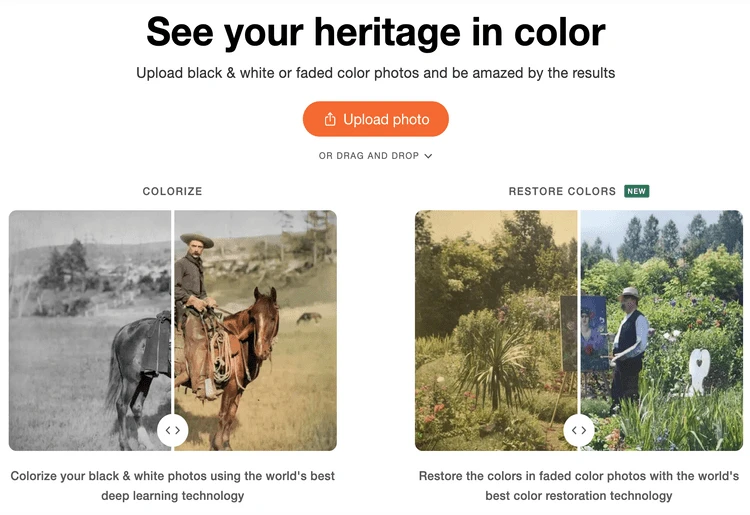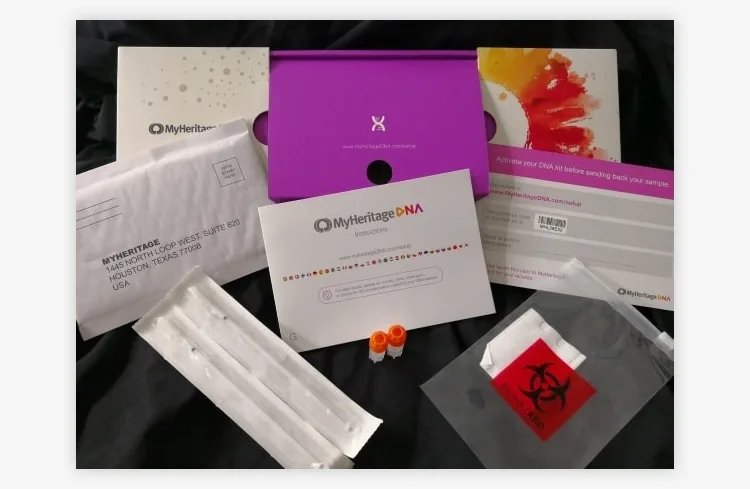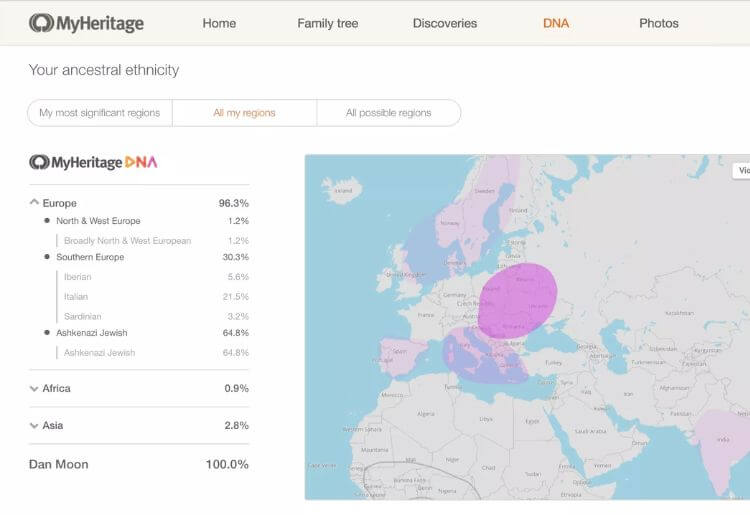MyHeritage offers a DNA kit that reveals your genetic origins across 2,114 regions of the world. This test requires a cheek swab. It is best for people who want to pinpoint their ethnic origins and find new relatives. In four weeks, you will receive a report which includes:
Origins: Where in the world your ancestors came from, listed by geographic region. The report is broken out by the percentage of your DNA from each region.
Relatives: Your report will include a list of “matches”—people who share DNA with you. These matches are created from the database of those who have tested with MyHeritage as well as other services. Matches are reported with the percentage of DNA they share with you and their likely level of relationship: first cousin, second cousin, etc.
MyHeritage uses autosomal DNA testing, which passes through all ancestors, male and female (unlike mtDNA which gets passed only from mothers, and YDNA, which gets passed on from fathers to sons). Autosomal testing can trace ancestry through 6-8 generations, or 150-200 years.
MyHeritage customers who would like to learn more about their genetic risk of certain diseases can upgrade to MyHeritage DNA Health for an additional fee.
The kit comes with a free 30-day trial of their “Complete” service. This includes a family tree builder that provides instant access to 19.6 billion historical records to link to your family tree.
As soon as you create an account on MyHeritage—whether you buy their kit or not—they will set up your free family tree site. Here, you can upload a family tree from another service or manually add details about your family. You will instantly have access to several free features like:
With basic information about your parents and grandparents, the free version of your family tree site will provide “Smart Matches,” people who appear in other family trees in their system. MyHeritage will prompt you to review and confirm these possible relatives.When you confirm a relative, you can add them to your family tree.
You will also have access to photo tools to animate, colorize, or enhance old family pictures.
If you upgrade to a paid family tree service, you can access additional services:
Premium - Has additional features to collaborate with other family tree managers
PremiumPlus - Adds the ability to search MyHeritage’s database of family trees and historical records.
Complete - Adds the ability to search, match, and extract information from billions of linked historical records and family tree profiles.

To order a test kit from MyHeritage, you’ll need to set up an account using your email address, birth year, and a password. After you place your order, your kit should arrive within a few days. Here’s what’s in the box:
Instructions
Activation card
Two vials
Two cheek swabs
One plastic bag
Return envelope

You’ll need to activate your kit online using the code on your activation card. Then, collect your sample:
Remove one of the swabs from its cover
Scrape the inside of one of your cheeks for 30-60 seconds
Open a vial
Break the swab inside the vial at the marked line
Close the vial
Repeat the process on the other side with the remaining swab and vial
Place the vials inside the plastic bag
Place the bag inside the return envelope
Mail the envelope to the laboratory
Once your sample arrives at the MyHeritage lab, your results will be ready in three to four weeks. You will receive an email that your results are ready, and you will have to access them through the MyHeritage website. Log in to your account and click on DNA>Overview. Your results will include:
Your ethnicity estimates. This is a list of ethnicities and regions with your corresponding DNA percentages. There is also a world map that is shaded according to your results. You can click on shaded areas to learn more about each ethnicity and geographic area in your genetic makeup. You can also explore “family tree events” from this map. These are ancestral birth and death locations from within your family tree.
A list of DNA matches. This includes name, age range, country of residence, likely relationship level (1st, 2nd, 3rd cousin, etc.), and information on the shared percentage and segments of DNA. You can filter results by country of residence, level of relationship, and ethnicity.
If you have upgraded to DNA Health, you will also receive:
A health risk report. This details your risks for 27 conditions, including heart disease and breast cancer These are grouped according to your genetic level of risk: increased, average, or decreased compared to the general population.

Many people are hesitant to submit DNA samples out of concerns for privacy. If you are concerned about the future use of your DNA for government, insurance, or law enforcement purposes, be sure to read the detailed privacy policy on the MyHeritage website. Here are the highlights:
MyHeritage doesn’t sell or license personal or genetic data.
They do not provide data to insurance companies
They prohibit law enforcement use of its DNA services.
Users can delete their data from MyHeritage at any time, permanently and irreversibly.
You’ll be notified of any meaningful changes to their privacy policy.
MyHeritage has a comprehensive help center on their website, with answers to FAQs about account information, subscriptions, DNA kits and results, the MyHeritage mobile app, family tree research, and other areas.
The email address for customer support is support@myheritage.com
The customer support phone number is 1-844-994-1888. Their support center is open 24 hours a day, Monday through Saturday.
MyHeritage DNA kit has a list price of $89 but is currently on sale for $39. You will need to pay $5 shipping on a single kit, but shipping is free for two or more kits. Your kit will include a 30-day free trial of Complete, their full ancestry research service, normally valued at $299/year.
For $120 per test, you can upgrade to the MyHeritage DNA Health test, which reports on your genetic risk of certain medical conditions. An additional $99/year subscription will provide you with updates on your genetic health risks.
| Product | Regular Price | Sale Price |
|---|---|---|
DNA Test | $89 + $5 Shipping | $39 |
Premium family tree subscription | $129/year | $89 for the first year |
PremiumPlus family tree subscription | $209/year | $149 for the first year |
Complete family tree subscription | $299/year | $199 for the first year |
DNA Health test upgrade | $120 | N/A |
DNA Health subscription | $99 | N/A |
The sale price of the DNA test kit from MyHeritage is similar to that of AncestryDNA, its leading competitor for testing autosomal DNA. It is less expensive than the test kits from 23andMe and LivingDNA, but both of those kits include haplogroup information in their DNA test report in addition to autosomal genetic information.
MyHeritage runs pricing specials several times throughout the year, including Cyber Monday, Valentine’s Day, and other holidays.
| MyHeritage | 23andMe | |
|---|---|---|
Price per kit | $39+shipping | $79+shipping |
Collection type | Cheek swab | Saliva |
Results in | 3-4 weeks | 3-4 weeks |
DNA Test Type | Autosomal | Autosomal, mtDNA, Y-DNA (males only) |
MyHeritage and 23andMe are both excellent choices for exploring your genetic roots. Both analyze autosomal DNA to provide genetic ethnicity reports and DNA relatives, and both promise results within 3-4 weeks.
Here are some differences to keep in mind if you are deciding between these two services:
23andMe has a larger DNA database: 12 million vs. 5.7 million for MyHeritage.
MyHeritage has a vast collection of research records to help you research your family tree. 23andMe does not have access to these resources.
MyHeritage provides only autosomal DNA testing, while 23andMe also analyzes mtDNA and Y-DNA (in men) to provide Neanderthal and Haplogroups reports.
MyHeritage and AncestryDNA both offer detailed genetic information, excellent research resources, and similar price points. Here some key differences between the two companies:
AncestryDNA requires collecting a tube of saliva, while myHeritage uses the cheek swab method.
MyHeritage offers a 3-4 week turnaround for test results, versus up to 8 weeks for Ancestry.
Ancestry has a larger DNA database: 15 million users, compared to 5.7 million for MyHeritage.
Subscription offerings are generally less expensive for MyHeritage than for Ancestry, though Ancestry provides access to billions more research records.
MyHeritage and LivingDNA offer quite different products. If you are focused on creating a detailed family tree, MyHeritage is a better choice, with a larger database of users and access to billions of historical records. LivingDNA, on the other hand, offers detailed subregional ethnicity reports for specific areas (like the UK and Ireland), along with personalized wellness tips.
MyHeritage is one of the most popular DNA testing companies, and it’s easy to see why. Their kits are affordable and simple to use, and the reports are thorough and easy to understand. With the basic test, you’ll be able to explore your genetic ethnicity and connect with relatives. If you upgrade to one of their paid family tree subscriptions, you can dive into their library of records to flesh out your family history.
Nicky Lowney is an accredited health communication expert and writer for Top10. Having worked extensively in the pharmaceutical industry, Nicky specializes in translating complex medical information into content that informs and helps people. Nicky has also written for Tufts University School of Dental Medicine, and Decision Resources Group, among others.